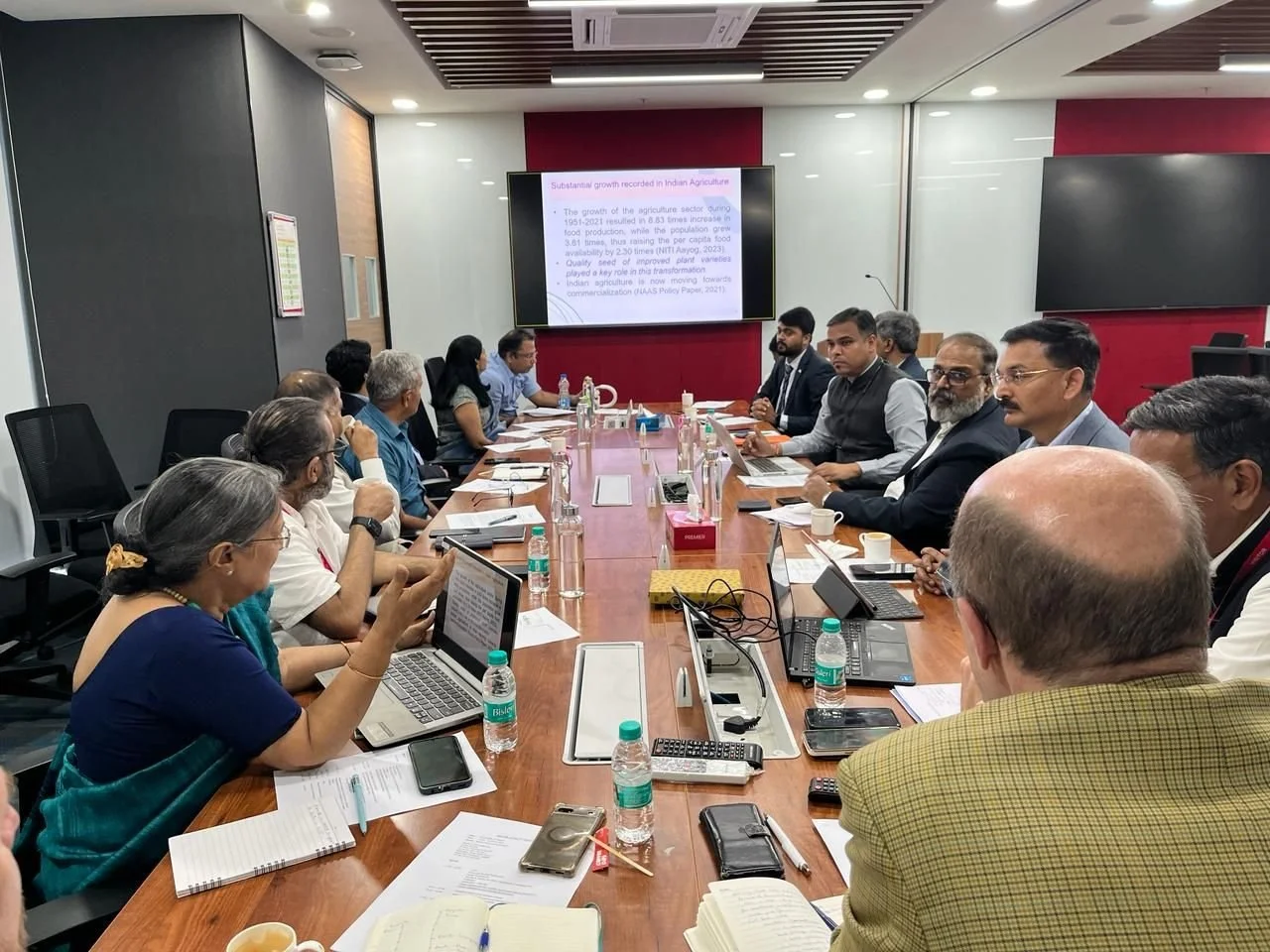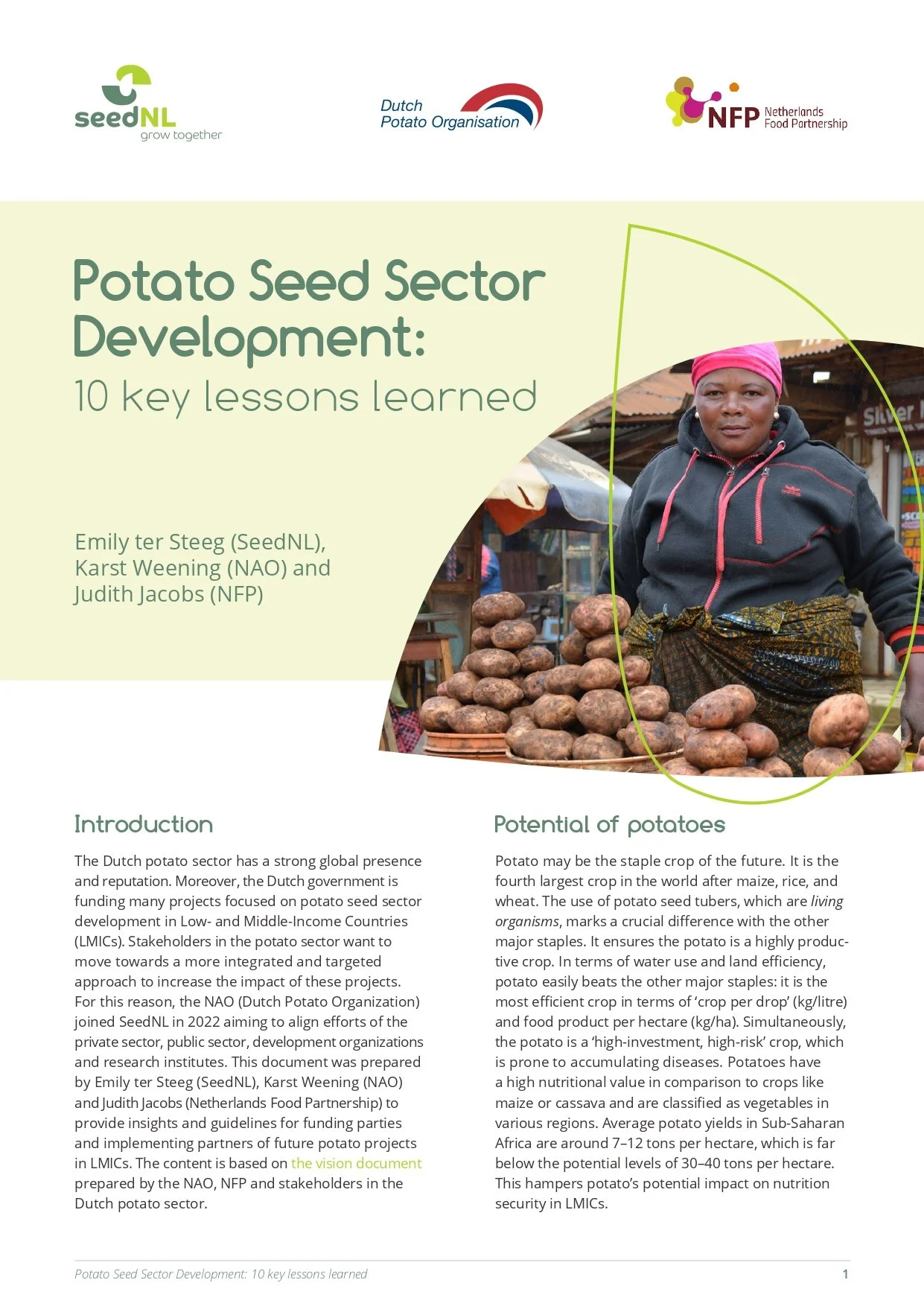
SeedNL Knowledge Hub
SeedNL is a one-stop-shop for actors within the seed sector who are hungry for knowledge.
This page is regularly updated with our most important knowledge products. At the bottom of this page we promote publications from other seed sector stakeholders. Are important knowledge products missing? Or would you like to learn more about a certain subject? Reach out to info@seednl.nl
Fact-finding study: the Indian seed sector
In 2023 - 2024, SeedNL embarked on a fact-finding study in India to assess the potential of India’s seed market, especially international seed trade, and to identify gaps, if any, that can be addressed through internal mechanisms or bilateral collaboration with the Netherlands. It resulted in the paper: Mapping the Landscape, Challenges, and Opportunities for International Seed Trade in India.
The Seeds For Food Coalition
It all began with the idea to create more synergies in the Seed Sector Development: the Seed for food coalition has been established with the aim to the contribution of seed security for small-holder farmers. The coalition aims to foster global advocacy and mobilize actions to support the complementarities of the formal and farmers seed system; and to strenghten their inherent interconnection with food.
Annual event 2023 Communiqué
On October 5, SeedNL's second Annual Event 'New Frontiers in Seed Sector Development' took place at Wageningen University & Research. The SeedNL family exchanged experiences, learnt from each other and make plans for the future through inspiring speeches, a panel of experts, and no less than eight break-out sessions.
Seed systems and climate change adaptation
Improved crop varieties are often proposed as one of the most promising pathways for smallholder producers to adapt to climate change. This KIT working paper, supported by SeedNL, explores what would be required from seed systems to assure smallholder farmers benefit from adapted cultivars to adapt to climate change. To do so, the paper addresses the promise of variety improvement in adapting to climate change from a smallholder farmer, seed-user perspective.
Seed Laws Toolbox: Scoping Study
The SeedNL partnership sees improving the enabling environment for seed business as key to the development of a vibrant seed sector. But seed regulatory frameworks are key bottlenecks hampering the development of the sector in developing countries and upcoming markets. Based on the positive experiences with the Plant Variety Protection (PVP) toolbox, the aim of this study, subsidised by the Dutch Ministry of Agriculture, Nature and Food Quality, is to explore and assess the possibility, relevance and arrangements of a Seed Laws Toolbox, providing regulatory support in areas beyond PVP.
Potato Seed Sector Development: 10 key lessons learned
This paper provides insights and guidelines for funders and implementers of potato projects in Low- and Middle Income Countries. With its high productivity, high nutritional value and efficient land and water use, potato may be the staple crop of the future. These ten potato commandments may help the potato reach is full potential.
Seed Scoping: Egypt
A comprehensive scoping study has been carried out to examine the development of Egypt's seed sector. The study received support from the Food & Nutrition Security (FNS) Support Facility, which is funded by the Ministry of Foreign Affairs of the Netherlands.
The primary objective of the study was to assess the challenges and aspirations at the sector level in Egypt, with a specific focus on the improvement of seed systems for cereals, food legumes, and vegetables. The aim is to establish a robust, innovative, competitive, resilient, and inclusive seed sector in the country.
This study serves as an example for more seed sector scoping studies in other countries with the support of SeedNL
SeedNL Evaluation
A lot has happened since our establishment in 2021.
To learn from the recent past and adapt for the near future, the Board of Directors commissioned an evaluation of SeedNL, from its inception to the start of 2023. The evaluation consisted of a desk study and interviews with 35 stakeholders resulting in lessons learned that are presented with some relevant trends and recommendations on amongst others: SeedNL’s objectives, ambitions, beneficiaries and governance, and resourcing.
The current covenant between the four partners, the Ministry of Foreign Affairs, Ministry of Agriculture, Nature and Food Quality, Plantum and Nao (Dutch Potato organization) will end this year. They all indicated the motivation to continue with SeedNL.
This guide provides different methods and tools to help assess the performance of a seed sector and design a national seed road map.
The guide intends was made to inspire policymakers commissioning assessments or road map development; researchers who want to better understand cause-effect relations in the seed sector; and practitioners who want to enhance the performance of a seed sector and advance the contribution of the seed sector to food system outcomes.
Quick scan of Dutch public investments in the seed sector
This document shows a short overview of Dutch foreign policy investment in developing seed sectors in the global South. Knowing how Dutch investments are made and where they are implemented helps inform SeedNL strategy. The overview also includes lessons learnt for various investment instruments.
SeedNL 2022 Annual Event Communiqué
At the end of 2022, the first SeedNL Annual event took place at the KIT Royal Tropical Institute in Amsterdam. The SeedNL Community of Practice was able to meet in person to exchange experiences, learn from each other and make plans for the future. The conference focused on Public-Private Partnerships for Change.
This communiqué outlines the key takeaways from the break-out sessions.
Guide for designing a National Seed Road Map
Our flagship projects: resources
Ethiopia
Please find various documents, such as our Institutional mapping & needs assessment of Ethiopia’s public seed sector services, on our dedicated webpage
Nigeria
Please find various documents, such as our Nigeria road map, on our dedicated webpage.
As a knowledge hub, we strive to not only showcase our own publications. Below are links to various knowledge products produced by other partners that we think are useful resources for seed sector stakeholders
Seed Business Management - Training Manual
Developed under the Rice Seed Sector Development (RSSD) and Integrated Seed Sector Development (ISSD) projects, this manual is a culmination of, amongst others, collaborative efforts between Welthungerhilfe (WHH) and Wageningen Centre for Development Innovation. It serves as a guide for professionals focused on enhancing the business acumen of seed producers across various scales – from individual farmers to larger seed companies.
Annual report 2022 NL-CGIAR Research Programme
The Netherlands (NL) – CGIAR research programme contributes to transformational change in agriculture around the world by advancing food system knowledge and joint public and private innovation. From 2017-2023, this programme is part of a cooperation agreement between the Government of the Netherlands and the CGIAR System Management Organization. This report presents a concise overview of the results and outcomes of Seed Systems Development projects and Senior Expert and PPP assignments as put forward in their final reports. The programme is funded by the Dutch Ministry of Foreign Affairs and implemented through NWO-WOTRO Science for Global Development. One of the three instruments of the programme, the Seed Systems Development (SSD) programme, funds projects on Enabling and Scaling Genetic Improvement and Propagation Material.
Navigating toward resilient and inclusive seed systems
Carried out under the umbrella of the initiative "Biodiversity for Opportunities, Livelihoods, and Development" (BOLD), which received funding from the Norwegian Agency for Development Cooperation. Furthermore, this work received additional support from the Research Council of Norway.
Ten Guiding Principles of Good Seed Aid Practice
Produced by Mercy Corps and SeedSystem, through ISSD Africa.
Authored by experts Peter Gildemacher, Paul C. Struik, Dirk Stemerding and Pim Lindthout, published by Wageningen Academic Publishers and KIT Royal Tropical Institute.












